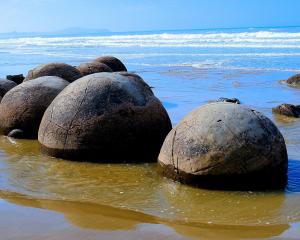As a child growing up, Heather Woodrow can remember her father telling her that "Uncle Ernie named the All Blacks".
It was common knowledge within the Booth family but not something that was widely acknowledged, Mrs Woodrow, of Oamaru, said.
Mrs Woodrow never knew her father's cousin - Ernest Edward Booth, of the 1905 Originals - as he died in 1935, but she did know Booth's brother, Clarrie, whom she recalled visiting in Hampden, and her father, the late Bert Booth, talked about him.
She remembered hearing how he would cycle from Hampden to Dunedin for rugby practices and she recalled seeing his cap and old black bicycle.
She did not know where his rugby memorabilia ended up and would be keen to hear from anyone with knowledge of it.
Mrs Woodrow has taken a keen interest in her family history and has compiled information about her famous relative.
Booth was born on February 24, 1876, at Teschemakers, and was a member of the Athletic rugby club in Oamaru and later the Kaikorai club in Dunedin.
He represented Otago 28 times between 1896 and 1908.
A fullback or three-quarter, he made his debut for New Zealand, aged 29, on July 12, 1905, against Metropolitan Union at Sydney.
Known by his nickname General, Booth was one of the Originals who made the historic tour of Britain and France in 1905-06.
An obituary following his death said Booth was "quite unconsciously" partially responsible for the team being dubbed the All Blacks.
Many of the players were training at West Ealing, and John Buttery, of the Daily Mail, was talking with Booth. Booth was a journalist helping the Daily Mail on the tour.
Two of the players wore black belts and their elastic kneelets and anklets were dyed black. Mr Buttery queried the idea and Booth reportedly said, jocularly, "Just to be All Black."
Buttery replied, "All Black - a great idea," and used the name in the Daily Mail. Other newspapers snapped up the phrase.
Booth played three tests and 21 games for the All Blacks and his last appearance was against Australia in 1907.
He moved to Sydney and played for New South Wales in 1908 and 1909.
He accompanied the 1908-09 Australian side on its tour of Britain as a press correspondent.
According to his player profile on the official All Blacks website, Booth was appointed a professional coach for the Southland union in the early 1920s.
It was a "startling innovation" in an era of strict amateurism.
As a result of protests from the national union, his position was redefined and he was given alternative employment, "but as he continued in his coaching role, it can be assumed some sort of euphemistic subterfuge had occurred".
In a book published in 1959, All Blacks in Chains, Invercargill-based journalist Morrie Mackenzie said Booth was the "inveterate foe of obtuse and pompous officialdom. He insisted the game was for the players and officials were merely there to see that the organisation functioned smoothly . . . he made enemies. But he got results and, inevitably, little thanks."
Booth died in Christchurch on October 18, 1935, aged 59, and he was buried in a family plot in the old Oamaru cemetery. The funeral cortege was met at the cemetery by rugby officials.
The headstone - which is included in historian Helen Stead's tours of the old cemetery - acknowledges he was a member of the 1905 All Blacks. He never married.
Two of Mrs Woodrow's grandsons - aged 6 and 4 - are following their famous forebear's footsteps by playing rugby for the Athletic club in Oamaru - and "they love it", she said.












